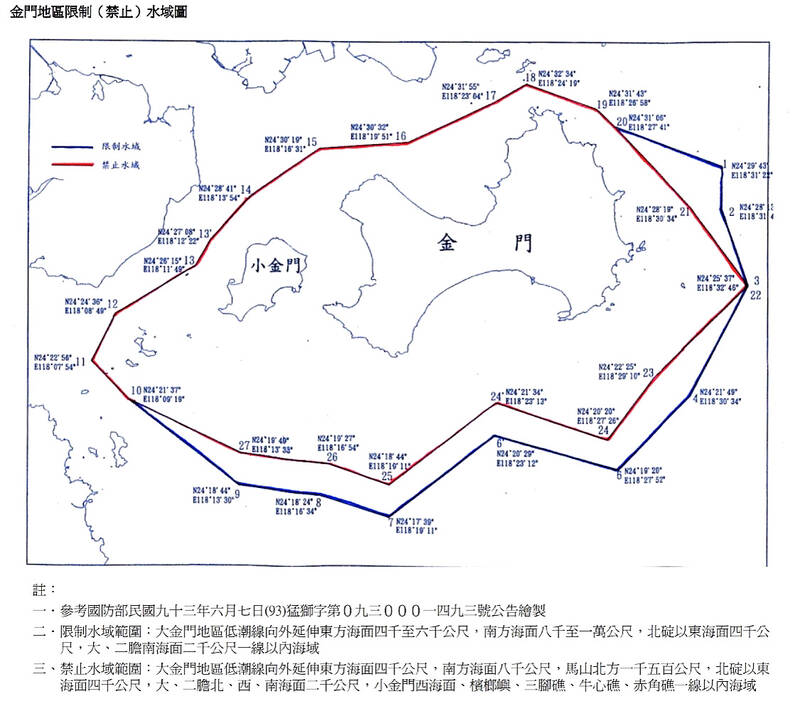A lawmaker has proposed a legal amendment to transfer authority to demarcate prohibited and restricted waters off Taiwan proper and Taiwan-controlled outlying islands from the defense ministry to the Ocean Affairs Council (OAC), saying that it would augment law enforcement in those areas.
Chinese Nationalist Party (KMT) Legislator Chen Yeong-kang (陳永康) crafted the draft legislation and held a public hearing on Friday.
In a written explanation accompanying the bill, Chen said that after the fatal capsizing of an unlicensed and unregistered Chinese speedboat in prohibited waters off the Kinmen Islands in February, China’s Taiwan Affairs Office publicly rejected the legality of the Taiwan-controlled prohibited and restricted waters off the Kinmen Islands.

Photo courtesy of the Mainland Affairs Council
Kinmen and the city of Xiamen in China’s Fujian Province are separated by less than 10km.
Chen said that under the Act Governing Relations Between the People of the Taiwan Area and the Mainland Area (臺灣地區與大陸地區人民關係條例), the Ministry of National Defense is mandated to declare the scope of the prohibited and restricted waters.
However, the Coast Guard Administration (CGA), an OAC agency, is designated as the competent authority and tasked with patrolling and law enforcement in those areas, he added.
Since the purpose of delineating prohibited and restricted waters is to maintain order on the sea, not national defense, that task should be undertaken by the CGA, Chen said.
Tamkang University Graduate Institute of International Affairs and Strategic Studies associate professor Alexander Huang (黃介正) said that transferring the task from a military agency to a law enforcement agency would not only signal that Taiwan has sovereignty over the overlapping waters, but would also de-escalate tensions.
However, Mainland Affairs Council Deputy Minister Liang Wen-chieh (梁文傑) said the proposed amendment “would not make much difference.”
Liang added that the prohibited and restricted waters have been enforced for more than three decades based on a tacit understanding between Taiwan and China, and that it is inappropriate to seek the other side’s validation through negotiations over the scope of the Taiwan-controlled water due to unforeseen incidents.
The capsizing of the Chinese boat on Feb. 14 occurred after a high-speed chase by a Taiwanese coast guard vessel which resulted in the death of two Chinese crew members.
Beijing criticized the Democratic Progressive Party’s “brutal” handling of the incident and on Feb. 19 China Coast Guard personnel boarded a Taiwanese cruise ship.
In the month following the incident, China Coast Guard vessels frequently entered Kinmen’s prohibited waters, saying it was conducting “legal” patrols, but were expelled by vessels dispatched by its Taiwanese counterpart.

Chinese Nationalist Party (KMT) Chairman Eric Chu (朱立倫), spokeswoman Yang Chih-yu (楊智伃) and Legislator Hsieh Lung-chieh (謝龍介) would be summoned by police for questioning for leading an illegal assembly on Thursday evening last week, Minister of the Interior Liu Shyh-fang (劉世芳) said today. The three KMT officials led an assembly outside the Taipei City Prosecutors’ Office, a restricted area where public assembly is not allowed, protesting the questioning of several KMT staff and searches of KMT headquarters and offices in a recall petition forgery case. Chu, Yang and Hsieh are all suspected of contravening the Assembly and Parade Act (集會遊行法) by holding

PRAISE: Japanese visitor Takashi Kubota said the Taiwanese temple architecture images showcased in the AI Art Gallery were the most impressive displays he saw Taiwan does not have an official pavilion at the World Expo in Osaka, Japan, because of its diplomatic predicament, but the government-backed Tech World pavilion is drawing interest with its unique recreations of works by Taiwanese artists. The pavilion features an artificial intelligence (AI)-based art gallery showcasing works of famous Taiwanese artists from the Japanese colonial period using innovative technologies. Among its main simulated displays are Eastern gouache paintings by Chen Chin (陳進), Lin Yu-shan (林玉山) and Kuo Hsueh-hu (郭雪湖), who were the three young Taiwanese painters selected for the East Asian Painting exhibition in 1927. Gouache is a water-based

Taiwan would welcome the return of Honduras as a diplomatic ally if its next president decides to make such a move, Minister of Foreign Affairs Lin Chia-lung (林佳龍) said yesterday. “Of course, we would welcome Honduras if they want to restore diplomatic ties with Taiwan after their elections,” Lin said at a meeting of the legislature’s Foreign Affairs and National Defense Committee, when asked to comment on statements made by two of the three Honduran presidential candidates during the presidential campaign in the Central American country. Taiwan is paying close attention to the region as a whole in the wake of a

OFF-TARGET: More than 30,000 participants were expected to take part in the Games next month, but only 6,550 foreign and 19,400 Taiwanese athletes have registered Taipei city councilors yesterday blasted the organizers of next month’s World Masters Games over sudden timetable and venue changes, which they said have caused thousands of participants to back out of the international sporting event, among other organizational issues. They also cited visa delays and political interference by China as reasons many foreign athletes are requesting refunds for the event, to be held from May 17 to 30. Jointly organized by the Taipei and New Taipei City governments, the games have been rocked by numerous controversies since preparations began in 2020. Taipei City Councilor Lin Yen-feng (林延鳳) said yesterday that new measures by